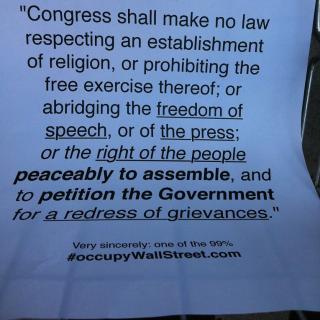Wright State University (WSU) teachers returned Monday morning at 9am to the picket line for the second week one day after Ohio’s State Employment Relations Board (SERB) rejected the university’s claim that the strike is unlawful. In a rare Sunday meeting, SERB found “the strike is authorized.” The next day by 9:30am 75 strikers had already assembled at the university’s main entrance.
The American Association of University Professors-Wright State University (AAUP-WSU) Contract Administration Officer Professor Noeleen McIlvenna, who has acted as the de facto communications director for the strike campaign said last week people “were feeling a little nervous” to be seen supporting the strike. Support grew throughout last week as people saw others were participating. “Once the SERB declared it bogus the last fear is gone. Now it feels like the world is supporting us,” McIlvenna said.
The intended purpose of the strike is to bring the university administration to the bargaining table. The minor victory for the union of having the right to strike validated comes after years of failed negotiations between the teachers and university administrators. The university squandered a budget surplus of $162 million over about 5 years down to around $31 million, but cut spending and regained a surplus of $10 million in 2017. Union members are critical of that the WSU President salary is nearly $700,000 per year including perks, according to union figures. Former adjunct faculty and strike supporter Taki Manolakos said, he had heard from a reliable source that the university’s lawyer, Daniel Guttman, takes in over $500,000 per year. Guttman was brought in to replace the chief negotiator Dr Steven Berberich in 2017 when, according to Manolakos, “the board [of trustees] decided they have been too lenient with the teacher unions.”
Meanwhile the administrators ask teachers, who make substantially less, to take a pay cut in real terms. The university administrators are unilaterally implementing a contract as their “last, best offer” which changes teacher workload guidelines, increases health care premiums, and creates furlough days where teachers will get paid less for the same work, among other points of contention.
But many feel the changes are bigger than just faculty compensation. Manolakos said, “They wanted to eliminate tenure...They want to eliminate the entire liberal arts.”
Guttman, who replaced the chief negotiator Dr Steven Berberich who made $213,000 in 2017, argued that the union engaged in an unlawful strike when union representatives made workload a reason for striking and attempted to “confound” the effort to replace the striking faculty with temporary teachers. While SERB’s determination did not address the issue of whether workload is an appropriate matter to strike over, SERB Chair W. Craig Zimpher pointed out that “the university has been acting on [workload]” as if it was a bargaining point. Guttman said he had proof that the union intentionally disrupted the process of finding replacements for the striking teachers. “You can’t make it more difficult for our replacements,” Guttman said. He claimed that the union representatives did this by advising their members to “strip” course content from an online learning portal called Pilot, and advising union members that they could respond in an indirect way to an email from the university that asked for confirmation of whether they will strike. The content on Pilot is the intellectual property of teachers, and McIlvenna, who sent the email, explained she told members to strip their content off the portal as part of a list of instructions to remember to clear desks, and take personal items with them. Guttman argued unsuccessfully that “once you’ve elected to [upload content] you can’t undo it,” and compared the teachers taking their intellectual property off the portal to spoiling employer property. Attorney for the Union, Susannah Muskovitz, wrote in her brief for the case before SERB that “What the University is alleging is that faculty who are on strike should somehow be required to assist the University’s scabs [or strike breakers] to teach their classes. That would be absurd.”
Muskovitz also addressed the allegation that the union advised members to provide indirect responses to the university attempting to determine who would strike. She said Associate Vice President Shari Mickey-Boggs “threatened [all bargaining unit members] if they did not respond, she would assume they were going on strike and would cut off their pay and healthcare benefits. This is inherently coercive.” Gutman had argued that the union instructed their members to deceive the university as to whether they were striking in order to make replacing teachers more difficult. Guttman estimated 50 to 70 “professors said they were coming [to work] and they didn’t.” He explained finding replacements for specialized teachers at the last minute is difficult since “college professors are widgets.”
Muskovitz wrote in her brief “What the University should do is rescind the unilaterally implemented contract, return to the bargaining table, and recognize the faculty for who they are – an essential part of the University and professionals who deserve a decent labour contract.”
McIlvenna explained, “This was a public relations kind of thing for them to suggest maybe the strike is illegal.”
Wright State University (WSU) teachers returned Monday morning at 9am to the picket line for the second week one day after Ohio’s State Employment Relations Board (SERB) rejected the university’s claim that the strike is unlawful. In a rare Sunday meeting, SERB found “the strike is authorized.” The next day by 9:30am 75 strikers had already assembled at the university’s main entrance.
The American Association of University Professors-Wright State University (AAUP-WSU) Contract Administration Officer Professor Noeleen McIlvenna, who has acted as the de facto communications director for the strike campaign said last week people “were feeling a little nervous” to be seen supporting the strike. Support grew throughout last week as people saw others were participating. “Once the SERB declared it bogus the last fear is gone. Now it feels like the world is supporting us,” McIlvenna said.
The intended purpose of the strike is to bring the university administration to the bargaining table. The minor victory for the union of having the right to strike validated comes after years of failed negotiations between the teachers and university administrators. The university squandered a budget surplus of $162 million over about 5 years down to around $31 million, but cut spending and regained a surplus of $10 million in 2017. Union members are critical of that the WSU President salary is nearly $700,000 per year including perks, according to union figures. Former adjunct faculty and strike supporter Taki Manolakos said, he had heard from a reliable source that the university’s lawyer, Daniel Guttman, takes in over $500,000 per year. Guttman was brought in to replace the chief negotiator Dr Steven Berberich in 2017 when, according to Manolakos, “the board [of trustees] decided they have been too lenient with the teacher unions.”
Meanwhile the administrators ask teachers, who make substantially less, to take a pay cut in real terms. The university administrators are unilaterally implementing a contract as their “last, best offer” which changes teacher workload guidelines, increases health care premiums, and creates furlough days where teachers will get paid less for the same work, among other points of contention.
But many feel the changes are bigger than just faculty compensation. Manolakos said, “They wanted to eliminate tenure...They want to eliminate the entire liberal arts.”
Guttman, who replaced the chief negotiator Dr Steven Berberich who made $213,000 in 2017, argued that the union engaged in an unlawful strike when union representatives made workload a reason for striking and attempted to “confound” the effort to replace the striking faculty with temporary teachers. While SERB’s determination did not address the issue of whether workload is an appropriate matter to strike over, SERB Chair W. Craig Zimpher pointed out that “the university has been acting on [workload]” as if it was a bargaining point. Guttman said he had proof that the union intentionally disrupted the process of finding replacements for the striking teachers. “You can’t make it more difficult for our replacements,” Guttman said. He claimed that the union representatives did this by advising their members to “strip” course content from an online learning portal called Pilot, and advising union members that they could respond in an indirect way to an email from the university that asked for confirmation of whether they will strike. The content on Pilot is the intellectual property of teachers, and McIlvenna, who sent the email, explained she told members to strip their content off the portal as part of a list of instructions to remember to clear desks, and take personal items with them. Guttman argued unsuccessfully that “once you’ve elected to [upload content] you can’t undo it,” and compared the teachers taking their intellectual property off the portal to spoiling employer property. Attorney for the Union, Susannah Muskovitz, wrote in her brief for the case before SERB that “What the University is alleging is that faculty who are on strike should somehow be required to assist the University’s scabs [or strike breakers] to teach their classes. That would be absurd.”
Muskovitz also addressed the allegation that the union advised members to provide indirect responses to the university attempting to determine who would strike. She said Associate Vice President Shari Mickey-Boggs “threatened [all bargaining unit members] if they did not respond, she would assume they were going on strike and would cut off their pay and healthcare benefits. This is inherently coercive.” Gutman had argued that the union instructed their members to deceive the university as to whether they were striking in order to make replacing teachers more difficult. Guttman estimated 50 to 70 “professors said they were coming [to work] and they didn’t.” He explained finding replacements for specialized teachers at the last minute is difficult since “college professors are widgets.”
Muskovitz wrote in her brief “What the University should do is rescind the unilaterally implemented contract, return to the bargaining table, and recognize the faculty for who they are – an essential part of the University and professionals who deserve a decent labour contract.”
McIlvenna explained, “This was a public relations kind of thing for them to suggest maybe the strike is illegal.”



